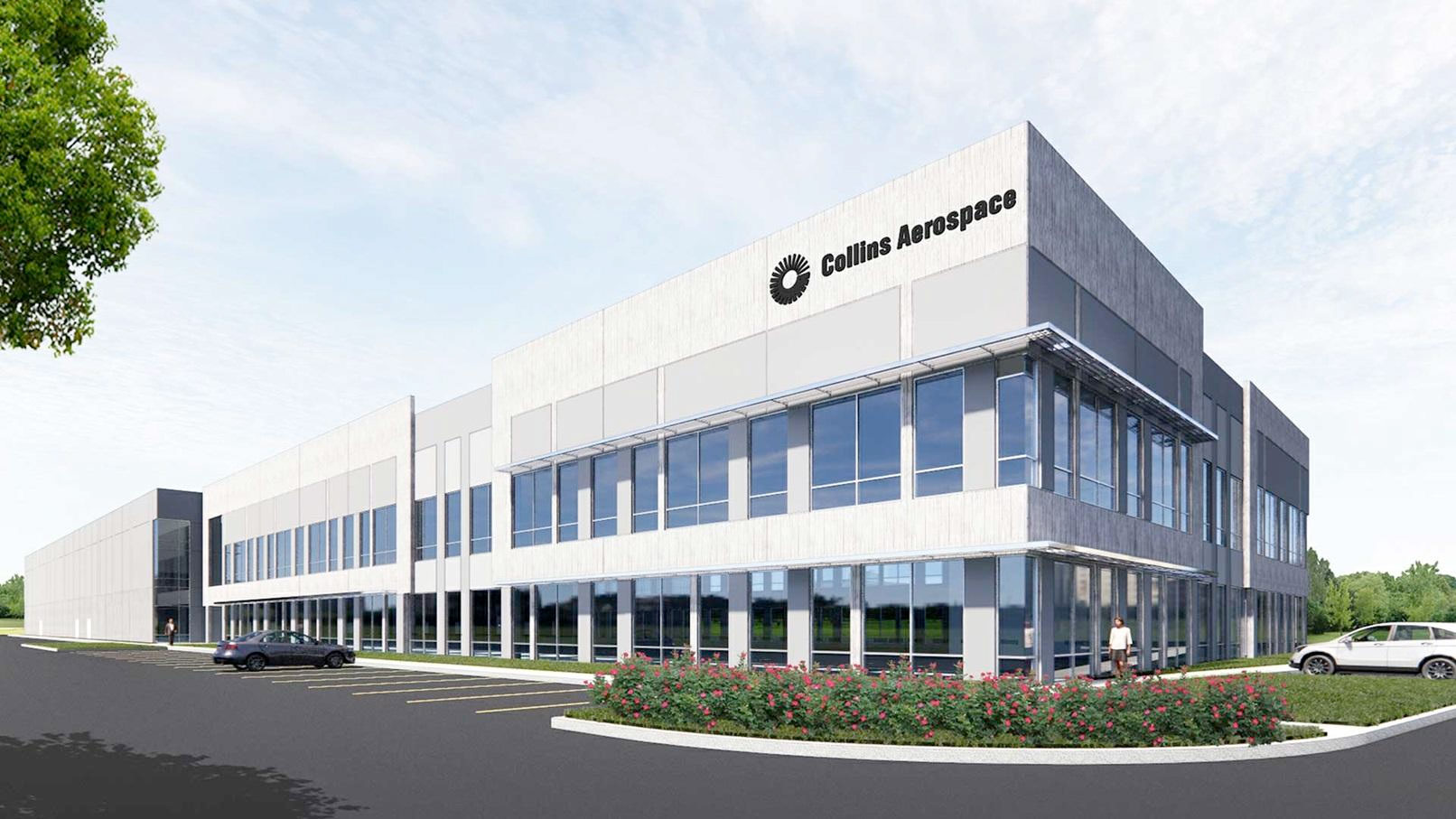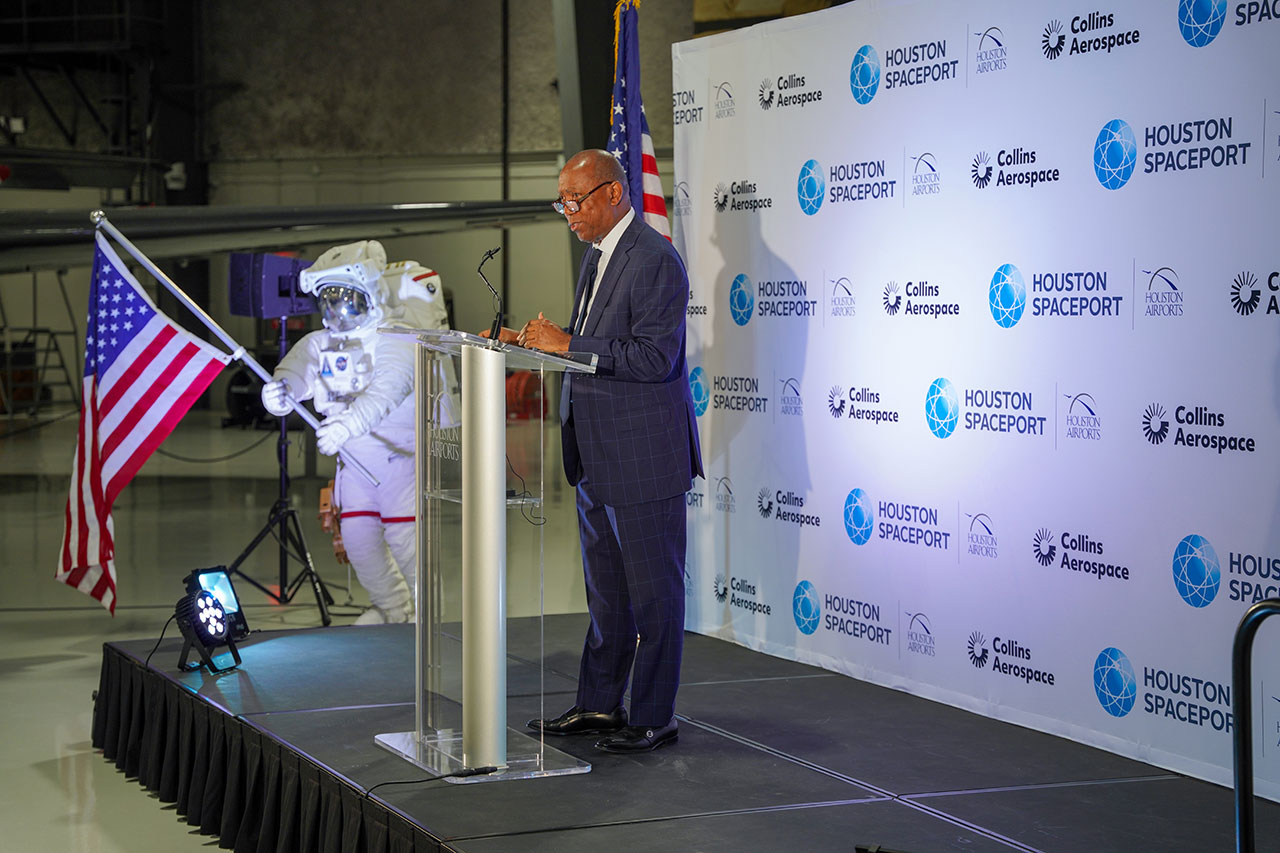Collins Aerospace to support NASA life support systems at new Houston Spaceport campus

HOUSTON — More than 50 years after it provided the communications link between Houston and the moon, Collins Aerospace is again helping connect "Space City" with the future of U.S. activities in space.
The aerospace company, a unit of Raytheon Technologies, has become an anchor tenant at Houston Spaceport, the "world's first truly urban commercial spaceport." Collins Aerospace executives joined city and spaceport officials on Monday (June 7) to ceremonially break ground on its new 8-acre (3.2 hectares), approximately 120,000-square-foot (11,150 square meters) campus located at Ellington Airport.
"Today we are once again standing before you and the rest of the world to fortify our position as the Space City," said Houston Mayor Sylvester Turner, addressing an invited audience at the Lone Star Flight Museum, where the groundbreaking was held. "I am pleased to announce that Collins Aerospace has joined the Houston Spaceport family."
"You may remember the famous broadcast from the moon when Neil Armstrong said, 'That's one small step for man, one giant leap for mankind.' That message was received by mission control, right here in the City of Houston — and [now] there is yet another tie to that day. Neil Armstrong used a Collins radio to broadcast that message, [from] the same organization that is now planting its roots in our soil," said Turner.
Related: Photos from NASA's Apollo moon missions
Suited for growth
The new Collins Aerospace campus at Houston Spaceport will replace the company's current offices near NASA's Johnson Space Center, which has reached capacity. The facility will continue to be part of the company's Mission Systems business, providing life support systems for NASA's spacesuits now in use aboard the International Space Station and for the agency's Orion crew spacecraft on future Artemis missions to the moon.
The new location will also host Houston's first incubator supporting spaceflight, with a 10,000-square-foot (930 square meters) area set aside for startups and universities to collaborate on solving space technology challenges, including robotics, medicine and additive manufacturing.
Breaking space news, the latest updates on rocket launches, skywatching events and more!
"[The new] facility will enable Collins to continue to support the evolution of our tried and true products, including the support for future spacesuit development," said Allen Flynt, vice president and general manager for civil space and sea systems at Collins Aerospace. "Being part of the Houston Spaceport will provide a great environment, not only for Collins, but other members of the space community. We can come together and help facilitate collaboration."
As an anchor tenant of the spaceport, Collins will receive up to $25.6 million in financing from Houston Airports for capital improvements. The amount will be reimbursed by the company.
"We're very excited about our new home at the Houston Spaceport. We hope to occupy that no less than a year from now," said Flynt.

Leading the way
"I am confident that the cluster of aerospace companies being brought together here at Houston Spaceport will not only revitalize our city's name, but it will also energize our workforce," said Mayor Turner. "I am proud to say that Houston is leading the way and is doing more than any other spaceport in the nation to attract the best of the best."
Collins is the second anchor tenant and third company to relocate to Houston Spaceport. Intuitive Machines, which is under contract with NASA to land payloads on the moon beginning in 2022, was first, followed by Axiom Space, which in December announced plans to build its 14-acre (5.7 hectares) headquarters at the spaceport. Axiom's campus will be used to train astronauts and build the world's first free-flying commercial space station.
Licensed by the Federal Aviation Administration in 2015 as the nation's 10th commercial spaceport (three more have been added since), Houston Spaceport's urban location prevents it from hosting vertical launches, but it may someday support horizontal takeoff and landing space vehicles. For now, the focus is on growing Houston's role in the space industry community.
"No longer are we satisfied to be called 'Space City' because we track all U.S. [crewed] flights from Houston," said Mario Diaz, director of Houston Airports. "With Collins' commitment, we are prepared to build the vehicles, to power them, control them and navigate them, from takeoff to landing, across the backdrop and breadth of space."
Robert Pearlman is a Space.com contributing writer and the editor of collectSPACE.com, a Space.com partner site and the leading space history news publication. Follow collectSPACE on Facebook and on Twitter at @collectSPACE. Follow us @Spacedotcom and Facebook.
Join our Space Forums to keep talking space on the latest missions, night sky and more! And if you have a news tip, correction or comment, let us know at: community@space.com.

Robert Pearlman is a space historian, journalist and the founder and editor of collectSPACE.com, a daily news publication and community devoted to space history with a particular focus on how and where space exploration intersects with pop culture. Pearlman is also a contributing writer for Space.com and co-author of "Space Stations: The Art, Science, and Reality of Working in Space” published by Smithsonian Books in 2018.
In 2009, he was inducted into the U.S. Space Camp Hall of Fame in Huntsville, Alabama. In 2021, he was honored by the American Astronautical Society with the Ordway Award for Sustained Excellence in Spaceflight History. In 2023, the National Space Club Florida Committee recognized Pearlman with the Kolcum News and Communications Award for excellence in telling the space story along the Space Coast and throughout the world.

